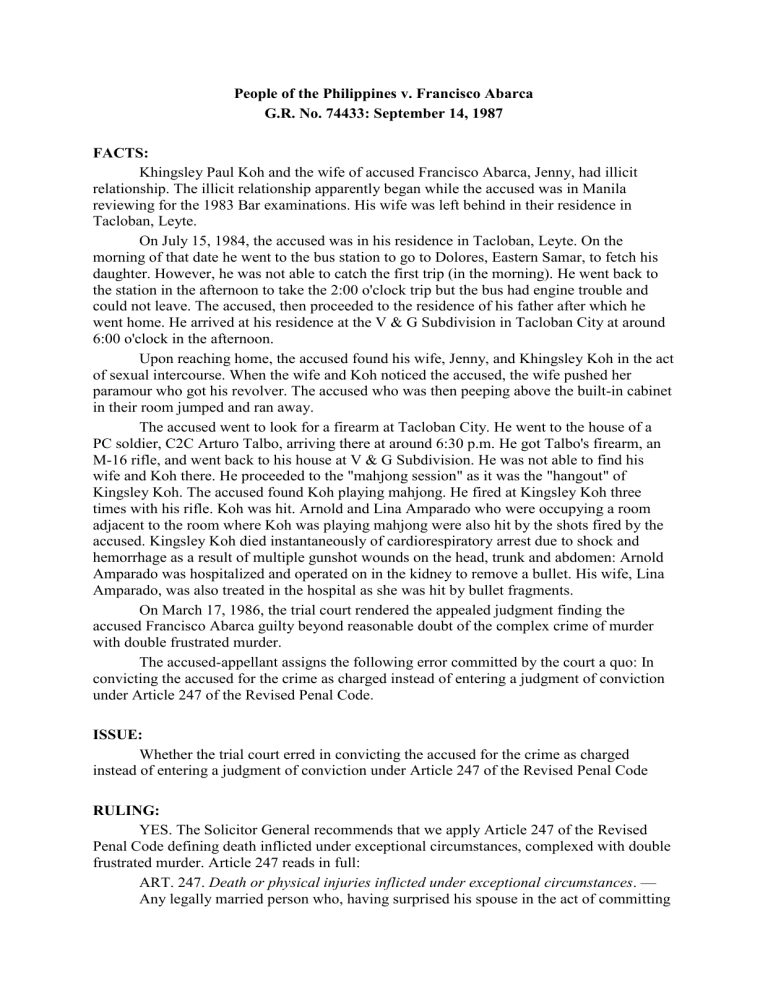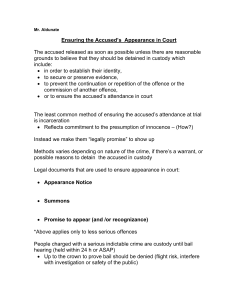
People of the Philippines v. Francisco Abarca G.R. No. 74433: September 14, 1987 FACTS: Khingsley Paul Koh and the wife of accused Francisco Abarca, Jenny, had illicit relationship. The illicit relationship apparently began while the accused was in Manila reviewing for the 1983 Bar examinations. His wife was left behind in their residence in Tacloban, Leyte. On July 15, 1984, the accused was in his residence in Tacloban, Leyte. On the morning of that date he went to the bus station to go to Dolores, Eastern Samar, to fetch his daughter. However, he was not able to catch the first trip (in the morning). He went back to the station in the afternoon to take the 2:00 o'clock trip but the bus had engine trouble and could not leave. The accused, then proceeded to the residence of his father after which he went home. He arrived at his residence at the V & G Subdivision in Tacloban City at around 6:00 o'clock in the afternoon. Upon reaching home, the accused found his wife, Jenny, and Khingsley Koh in the act of sexual intercourse. When the wife and Koh noticed the accused, the wife pushed her paramour who got his revolver. The accused who was then peeping above the built-in cabinet in their room jumped and ran away. The accused went to look for a firearm at Tacloban City. He went to the house of a PC soldier, C2C Arturo Talbo, arriving there at around 6:30 p.m. He got Talbo's firearm, an M-16 rifle, and went back to his house at V & G Subdivision. He was not able to find his wife and Koh there. He proceeded to the "mahjong session" as it was the "hangout" of Kingsley Koh. The accused found Koh playing mahjong. He fired at Kingsley Koh three times with his rifle. Koh was hit. Arnold and Lina Amparado who were occupying a room adjacent to the room where Koh was playing mahjong were also hit by the shots fired by the accused. Kingsley Koh died instantaneously of cardiorespiratory arrest due to shock and hemorrhage as a result of multiple gunshot wounds on the head, trunk and abdomen: Arnold Amparado was hospitalized and operated on in the kidney to remove a bullet. His wife, Lina Amparado, was also treated in the hospital as she was hit by bullet fragments. On March 17, 1986, the trial court rendered the appealed judgment finding the accused Francisco Abarca guilty beyond reasonable doubt of the complex crime of murder with double frustrated murder. The accused-appellant assigns the following error committed by the court a quo: In convicting the accused for the crime as charged instead of entering a judgment of conviction under Article 247 of the Revised Penal Code. ISSUE: Whether the trial court erred in convicting the accused for the crime as charged instead of entering a judgment of conviction under Article 247 of the Revised Penal Code RULING: YES. The Solicitor General recommends that we apply Article 247 of the Revised Penal Code defining death inflicted under exceptional circumstances, complexed with double frustrated murder. Article 247 reads in full: ART. 247. Death or physical injuries inflicted under exceptional circumstances. — Any legally married person who, having surprised his spouse in the act of committing sexual intercourse with another person, shall kill any of them or both of them in the act or immediately thereafter, or shall inflict upon them any serious physical injury, shall suffer the penalty of destierro. If he shall inflict upon them physical injuries of any other kind, he shall be exempt from punishment. These rules shall be applicable, under the same circumstances, to parents with respect to their daughters under eighteen years of age, and their seducers, while the daughters are living with their parents. Any person who shall promote or facilitate prostitution of his wife or daughter, or shall otherwise have consented to the infidelity of the other spouse shall not be entitled to the benefits of this article. We agree with the Solicitor General that the aforequoted provision applies in the instant case. There is no question that the accused surprised his wife and her paramour, the victim in this case, in the act of illicit copulation, as a result of which, he went out to kill the deceased in a fit of passionate outburst. Article 247 prescribes the following elements: (1) that a legally married person surprises his spouse in the act of committing sexual intercourse with another person; and (2) that he kills any of them or both of them in the act or immediately thereafter. These elements are present in this case. The trial court, in convicting the accused-appellant of murder, therefore erred. Though quite a length of time, about one hour, had passed between the time the accused-appellant discovered his wife having sexual intercourse with the victim and the time the latter was actually shot, the shooting must be understood to be the continuation of the pursuit of the victim by the accused-appellant. The Revised Penal Code, in requiring that the accused "shall kill any of them or both of them . . . immediately" after surprising his spouse in the act of intercourse, does not say that he should commit the killing instantly thereafter. It only requires that the death caused be the proximate result of the outrage overwhelming the accused after chancing upon his spouse in the basest act of infidelity. But the killing should have been actually motivated by the same blind impulse, and must not have been influenced by external factors. The killing must be the direct by-product of the accused's rage.







